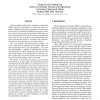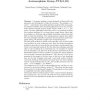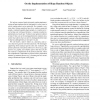32 search results - page 6 / 7 » Orbit-counting polynomials for graphs and codes |
CORR
2011
Springer
13 years 1 months ago
2011
Springer
We consider the problem of computing numerical invariants of programs by abstract interpretation. Our method eschews two traditional sources of imprecision: (i) the use of widenin...
CGO
2003
IEEE
13 years 10 months ago
2003
IEEE
Existing profile-guided partial redundancy elimination (PRE) methods use speculation to enable the removal of partial redundancies along more frequently executed paths at the expe...
DM
2006
13 years 6 months ago
2006
A computer package is being developed at Bayreuth for the generation and investigation of discrete structures. The package is a C and C++ class library of powerful algorithms endow...
FOCS
2003
IEEE
13 years 11 months ago
2003
IEEE
We initiate a general study of pseudo-random implementations of huge random objects, and apply it to a few areas in which random objects occur naturally. For example, a random obj...
CPM
2004
Springer
13 years 11 months ago
2004
Springer
In this paper we investigate the protein sequence design (PSD) problem (also known as the inverse protein folding problem) under the Canonical model 4 on 2D and 3D lattices [12, 25...



